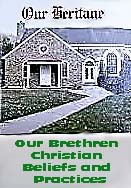MOSES AND
ELIJAH
First, we now look at the men, MOSES AND ELIJAH—Moses, the
heroic law-giver of the people; Elijah, the lion-hearted prophet of God. Moses,
the founder of the economy in the midst of which Christ carried on His earthly
mission up to the point of His rejection; Elijah, the reformer, the messenger
of heaven to a decadent age, to a people who were heirs of the oracles, and yet
were disobedient to them, to a people of whom it could be said, "They feared Jehovah, and served their
own gods," (2 Kings 17:33)
to a people who very largely were given over to the worship of Baal, while
still professing to have covenant relations with Jehovah, examples of that which was to come about in the
church age.
Moses had received the law, and
given it to the people. Elijah had called the people back to the law. They were
the two most remarkable figures in the whole of the Mosaic economy, the founder
and the reformer, the law-giver and the vindicator of its authority, who called
the nation to return to its allegiance; men who both had led the people in some
great Divine movement, the one initiating a new order of things in the world,
the other repeating the principles upon which that order was based, in the
days when the chosen nation had become disobedient.
Yet from what different experiences
had they come to the holy mount? This was Moses' first visit to Palestine.
Never before had he stood in the land of promise. He had seen it from afar at
the close of his work, and now he had come to stand —
“With glory wrapped
around
On the hills he never
trod,
And speak of the
strife which won our life,
With the Incarnate Son
of God."
If it is possible in any measure to
appreciate the feelings those who dwell in the light of heaven, by those of the
dwellers on earth, one can imagine with what keen interest Moses stood upon
that holy mount. He had seen it from afar, had led the people almost to the
verge of possession, and then had died in the land of Moab, and received the
high and holy honor of burial by God. (Jude
9) Centuries had passed, and at last he stood within the land, not having
won his way thereunto by the law as given to him on Sinai, but by the infinite
grace of God as manifested in the Person of His Son, with Whom he now held
conversation.
Elijah's experience was very
different. In all probability he was familiar with every part of the holy
land. He had moved across it, founding the schools of the prophets, and
endeavoring therein to prepare men to carry on his ministry when he had
departed. He must have loved the land with a great love, wherein once he had
stood —as he wrongfully thought—the only man loyal to God.
Now he was back in the land again,
but under such different circumstances. He who did not die—for the chariots and
horses of fire had separated him from Elisha, and the whirlwind had caught him
to the saints' abode—had returned to the earth to talk of the one and only death
with the Son of God.

No comments:
Post a Comment